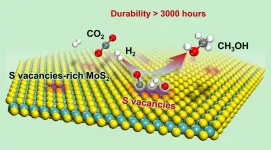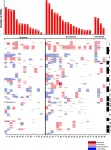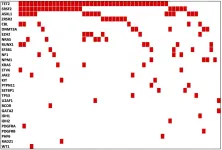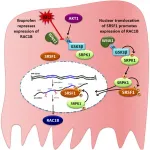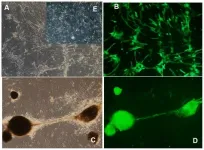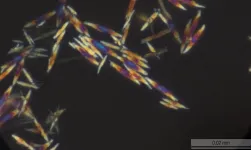(Press-News.org) Less than a decade after unveiling the "Map of Life," a global database that marks the distribution of known species across the planet, Yale researchers have launched an even more ambitious and perhaps important project -- creating a map of where life has yet to be discovered.
For Walter Jetz, a professor of ecology and evolutionary biology at Yale who spearheaded the Map of Life project, the new effort is a moral imperative that can help support biodiversity discovery and preservation around the world.
"At the current pace of global environmental change, there is no doubt that many species will go extinct before we have ever learned about their existence and had the chance to consider their fate," Jetz said. "I feel such ignorance is inexcusable, and we owe it to future generations to rapidly close these knowledge gaps."
The new map of undiscovered species was published March 22 in the journal Nature Ecology & Evolution. A browsable version is available at mol.org/patterns/discovery.
Lead author Mario Moura, a former Yale postdoctoral associate in Jetz's lab and now professor at Federal University of Paraiba, said the new study shifts the focus from questions like "How many undiscovered species exist?" to more applied ones such as "Where and what?"
"Known species are the 'working units' in many conservation approaches, thus unknown species are usually left out of conservation planning, management, and decision-making," Moura said. "Finding the missing pieces of the Earth's biodiversity puzzle is therefore crucial to improve biodiversity conservation worldwide."
According to conservative scientific estimates, only some 10 to 20 percent of species on earth have been formally described. In an effort to help find some of these missing species, Moura and Jetz compiled exhaustive data that included the location, geographical range, historical discovery dates, and other environmental and biological characteristics of about 32,000 known terrestrial vertebrates. Their analysis allowed them to extrapolate where and what kinds of unknown species of the four main vertebrate groups are most likely to yet be identified.
They looked at 11 key factors which allowed the team to better predict locations where undiscovered species might be located. For instance, large animals with wide geographical ranges in populated areas are more likely to have already been discovered. New discoveries of such species are likely to be rare in the future. However, smaller animals with limited ranges who live in more inaccessible regions are more likely to have avoided detection so far.
"The chances of being discovered and described early are not equal among species," Moura said. For instance, the emu, a large bird in Australia, was discovered in 1790 soon after taxonomic descriptions of species began. However, the small, elusive frog species Brachycephalus guarani wasn't discovered in Brazil until 2012, suggesting more such amphibians remain to be found.
Moura and Jetz show that the chances of new species discovery varies widely across the globe. Their analysis suggests Brazil, Indonesia, Madagascar, and Colombia hold the greatest opportunities for identifying new species overall, with a quarter of all potential discoveries. Unidentified species of amphibians and reptiles are most likely to turn up in neotropical regions and Indo-Malayan forests.
Moura and Jetz also focused on another key variable in uncovering missing species -- the number of taxonomists who are looking for them.
"We tend to discover the 'obvious' first and the 'obscure' later," Moura said. "We need more funding for taxonomists to find the remaining undiscovered species."
But the global distribution of taxonomists is greatly uneven and a map of undiscovered life can help focus new efforts, Jetz noted. That work will become increasingly important as nations worldwide gather to negotiate a new Global Biodiversity Framework under the Convention of Biological Diversity later this year and make commitments to halting biodiversity loss.
"A more even distribution of taxonomic resources can accelerate species discoveries and limit the number of 'forever unknown' extinctions," Jetz said.
With partners worldwide, Jetz and colleagues plan to expand their map of undiscovered life to plant, marine, and invertebrate species in the coming years. Such information will be help governments and science institutions grapple with where to concentrate efforts on documenting and preserving biodiversity, Jetz said.
INFORMATION:
This work was produced, in part, with the support of the National Geographic Society through a partnership with the E.O. Wilson Biodiversity Foundation.
Efficient conversion of CO2 is strategically significant for alleviating the energy crisis and achieving the goal of carbon neutrality. One promising conversion route is the hydrogenation of CO2 to methanol using a renewable energy-based "green hydrogen" source.
Traditional metal oxide catalysts for this reaction typically require a high temperature (>300 oC), which tends to promote undesired reverse water-gas shift (RWGS) side reactions, thus producing a large amount of CO as the by-product.
Introduction of transition metal components onto metal oxides can promote the activation of H2, thereby reducing the reaction temperature, but this also facilitates excessive hydrogenation of CO2 to CH4, leading to lowered methanol selectivity. Further improvement of the performance ...
Physicians across the country have analyzed the emerging scientific data about the long-term effects of COVID-19, creating an initial knowledge base about the clinical experiences of so-called "long-haulers" - patients with COVID-19 who experience prolonged symptoms and/or the emergence of new ones well after the initial viral infection has resolved. A comprehensive review published today in Nature Medicine offers an initial glimpse of the multi-organ effects of long-term COVID-19 and suggests a framework for the care of COVID-19 long-haulers through dedicated, multidisciplinary clinics.
"It was important to respond to our patients' concerns and pay close attention to the symptoms they were experiencing beyond the acute phase of COVID-19," said Kartik Sehgal, MD, a lead ...
Oncotarget published "Predictors of immunotherapy benefit in Merkel cell carcinoma" which reported that the authors retrospectively analyzed electronic health records and next-generation sequencing data of 45 patients treated at our institution from 2013 to 2020 to understand clinical and genomic correlates of benefit from immunotherapy.
They reported that their cohort predominantly included individuals with stage III disease at primary disease diagnosis and individuals with stage IV disease at recurrent/metastatic disease diagnosis.
Less advanced stages at primary disease diagnosis and shorter disease-free interval between completion of initial treatment and recurrence were each associated with greater odds of response.
Single-nucleotide ...
Oncotarget published "Cytogenetic and molecular landscape and its potential clinical significance in Hispanic CMML patients from Puerto Rico" which reported that one hundred and eleven Hispanic CMML patients from Puerto Rico were diagnosed in our institute from 2009 to 2018. Karyotypes were available in one hundred and seven patients.
Compared to previously published data, Hispanic CMML patients in this study had significantly lower rates of overall cytogenetic abnormalities and trisomy 8.
Among one hundred and eleven Hispanic CMML patients, 40-gene myeloid molecular profile tests were performed in fifty-six CMML patients.
Previous studies indicated that mutated ASXL1, DNMT3A, NRAS, RUNX1, and SETBP1 may associate with an unfavorable prognosis ...
Oncotarget published "Ibuprofen disrupts a WNK1/GSK3β/SRPK1 protein complex required for expression of tumor-related splicing variant RAC1B in colorectal cells" which reported that although the molecular mechanism behind the antitumor properties of NSAIDs has been largely attributed to inhibition of cyclooxygenases , several studies have shown that the chemopreventive properties of ibuprofen also involve multiple COX-independent effects.
One example is its ability to inhibit the alternative splicing event generating RAC1B, which is overexpressed in a specific subset ...
Aging-US published "Aging and rejuvenation - a modular epigenome model" which reported that the view of aging has evolved in parallel with the advances in biomedical sciences.
Long considered as an irreversible process where interventions were only aimed at slowing down its progression, breakthrough discoveries like animal cloning and cell reprogramming have deeply changed our understanding of postnatal development, giving rise to the emerging view that the epigenome is the driver of aging. The idea was significantly strengthened by the converging discovery that DNA methylation at specific CpG sites could be used as a highly accurate biomarker of age defined by an algorithm known as the Horvath clock (also published in Aging-US here).
It was at this point ...
Having the right tool for the job makes the job a lot easier, less expensive and faster. Chemical engineering researchers have now developed a virtual laboratory that can be used to determine the artificial intelligence (AI) tools best suited for addressing various chemical synthesis challenges in flow chemistry systems.
"Autonomous systems have tremendous potential for accelerating chemical R&D and manufacturing, but they are not in widespread use yet," says Milad Abolhasani, corresponding author of a paper on the work and an assistant professor of chemical engineering at North Carolina State University. "These systems face two kinds of ...
Scientists from MIPT and ITMO University and their colleagues have studied the formation and growth of crystals from simple organic molecules into large associations. These experiments will help create capsules for targeted drug delivery to specific tissues in the human body. The scientific paper was published in the journal Crystal Growth & Design.
Melamine cyanurate consists of melamine, colourless crystals, and cyanuric acid, whose molecules associate in a similar way to DNA formation. The various studies associated with it could be useful ...
COLUMBUS, Ohio - As psychedelics gain ground as a potential therapy for mental health disorders, there remains a pressing concern that patients in clinical trials may have adverse effects to the drugs.
New research identifies personality traits that have been associated with positive and negative experiences on psychedelics in previous studies, information that could help predict how future clinical trial participants will respond to the drugs.
The findings suggest that people more open to new experiences and willing to surrender to the unknown may be best positioned to have a positive experience on psychedelics, and individuals who tend to be preoccupied or apprehensive could be more likely to have a ...
ITHACA, N.Y. - As the COVID-19 pandemic took hold in 2020, the list of things people could not do grew increasingly long.
But while going to the office, attending live events and gathering with large groups of friends became difficult or impossible, other activities grew in popularity - including online learning.
Drawing on records from DataCamp, an online platform tailored toward programming skills, a research team at Cornell University and Arizona State University used U.S. states' staggered adoption of nonessential business closures (NBC) to estimate their effects on the demand for online learning. The gradual closure of businesses across the U.S. gave the researchers a way to make a case for the cause and effect of NBC on increased engagement with the DataCamp ...
